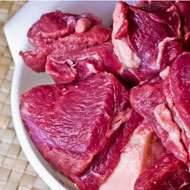
Vets raise ‘grave concern’
New figures released by the Food Standards Agency (FSA) show a marked rise in the number of animals killed without pre-stunning.
Analysis of the figures by the BVA has revealed that between April and June this year, almost a quarter (24.4 per cent) of sheep and goats had their throats slit without first being made numb to pain. This is up 15 per cent on 2013, when the EU and UK adopted legislation allowing an exemption for animals that are slaughtered for religious reasons.
The FSA figures also show that the number of chickens being slaughtered with pre-stunning soared from three per cent in 2013 to 18.5 per cent in 2017.
“This huge increase in the number of sheep, goats and poultry that are not stunned or not stunned effectively before slaughter is a grave concern to our profession. Millions of individual animals are affected, making this a major animal welfare issue,” commented BVA president Gudrun Ravetz.
“The supply of meat from animals that have not been stunned massively outstrips the demand from the communities for which it is intended and is entering the mainstream market unlabelled.”
She continues: “In the light of these official figures we reiterate our call for all animals to be stunned before slaughter. If slaughter without stunning is still to be permitted, any meat from this source must be clearly labelled and the supply of non-stun products should be matched with demand.”
According to the BVA’s latest Voice of the Veterinary Profession survey, welfare at slaughter is one of the most pressing health and welfare concern for vets.
The BVA has long-campaigned for the re-introduction of legislation that guarantees all animals are stunned before slaughter on welfare grounds. But while laws exist to allow slaughter without pre-stunning, the organisation is calling for comprehensive labelling on any fish or meat products from this source. This will enable customers to understand the choice they are making when buying such products, it adds.



 The Veterinary Medicines Directorate (VMD) is inviting applications from veterinary students to attend a one-week extramural studies (EMS) placement in July 2026.
The Veterinary Medicines Directorate (VMD) is inviting applications from veterinary students to attend a one-week extramural studies (EMS) placement in July 2026.